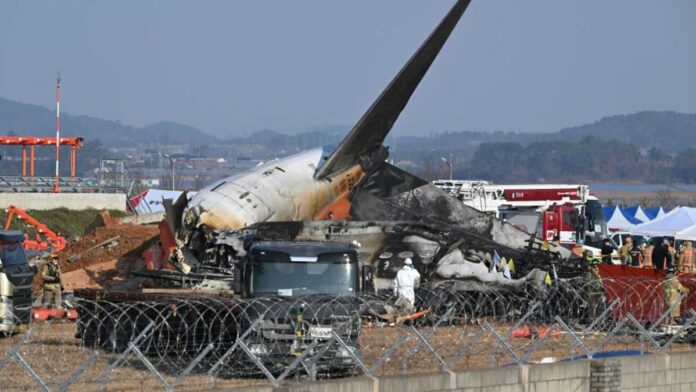A new update from South Korean investigators has revealed that a Jeju Air plane that crashed during an emergency landing in December still had one functional engine at the time of the incident, raising fresh questions about pilot decisions and the factors leading to South Korea’s deadliest aviation disaster in decades.
The Boeing 737-800, operated by Jeju Air, was attempting an emergency landing at Muan International Airport after reportedly striking birds shortly after takeoff. According to a July 19 update by the Aviation and Railway Accident Investigation Board (ARAIB), the aircraft belly-landed without lowering its landing gear, overshot the runway, slammed into an embankment, and burst into flames. Of the 181 people on board, only two survived.
Investigators: Pilots Shut Down Less-Damaged Engine
According to the confidential five-page report obtained by Reuters and reviewed by South Korean media, both engines were damaged by the bird strike. However, it was the left engine, considered less damaged, that was shut down by the crew just 19 seconds after impact. The right engine, which showed signs of severe internal damage and emitted black smoke and flames, continued to function and, according to investigators, was “generating output sufficient for flight.”
The update did not provide a reason for the crew’s decision to shut down the left engine. A source close to the investigation told Reuters that data from the cockpit voice recorder, onboard computer systems, and physical evidence from the wreckage confirm the left engine was intentionally shut off by the pilots.
This has drawn comparisons to the 1989 Kegworth air disaster in the UK, where pilots mistakenly shut down a functional engine, leading to regulatory reforms focused on cockpit communication and emergency response training.
Report Stirs Controversy, Families Seek Transparency
While the ARAIB has not released the July 19 update publicly, families of the victims were briefed on its contents. Many relatives objected to its release, arguing it prematurely appears to assign blame to the flight crew without fully exploring contributing factors.
“This document contains some new facts but omits far more, resulting in a cryptic and inconclusive summary,” said Greg Feith, a former U.S. National Transportation Safety Board (NTSB) investigator who reviewed a translated version of the report. He noted the lack of detailed analysis about the state of aircraft systems and engine performance.
The Jeju Air pilots’ union also criticized the report, accusing ARAIB of misleading the public. “Bird remains were found in both engines, and the left engine also experienced a surge,” said the union, citing black box data shared during the briefing with victims’ families.
Navigation Embankment Questioned
Another growing point of contention is the role of the concrete embankment at the end of Muan’s runway, which the plane struck after overshooting. The structure, which housed navigation equipment, was not designed to collapse on impact, potentially exacerbating the crash’s severity.
Global aviation standards require that such structures be built using frangible materials to minimize damage in the event of a collision. South Korea’s transport ministry has since acknowledged that seven domestic airports, including Muan, use embankments made of steel or concrete. Officials confirmed that plans to replace these with compliant, breakaway alternatives are underway.
Engine Analysis and Future Report
The aircraft’s engines, manufactured by CFM International, a joint venture between General Electric (GE) and France’s Safran, were examined in May. Preliminary findings indicated no mechanical defects unrelated to the bird strike and crash damage. ARAIB has said it will publish its final report in June 2026, in line with international standards that prohibit assigning legal blame but aim to improve aviation safety.
Jeju Air has reiterated its cooperation with the investigation and is awaiting the full findings. Boeing and GE have declined to comment, referring inquiries to ARAIB, while Safran has not responded to media requests.
As the investigation continues, families of victims, aviation experts, and the public alike are urging authorities to provide greater transparency and ensure that all contributing factors, including aircraft systems, pilot decision-making, and airport infrastructure, are thoroughly examined.
Written By Rodney Mbua



















